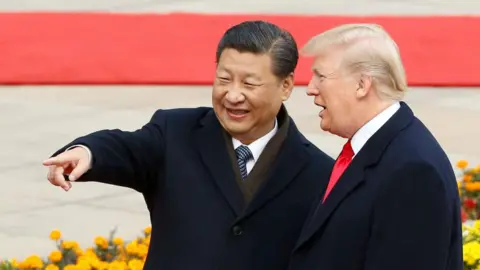Natalie ShermanBusiness reporter
 Getty Images
Getty ImagesUS President Donald Trump said he will impose additional 100% tariffs on imports from China starting next month.
In a social media post, Trump said the United States would also impose export controls on critical software.
In an earlier post on Friday, he responded to Beijing’s move this week to tighten its rules for rare earth exports, accusing China of “becoming too hostile” and trying to keep the world “captive.”
He threatened to withdraw from a meeting with Chinese President Xi Jinping. He later said he didn’t cancel it, but he didn’t know “we were going to get it.”
“I’ll be there regardless,” he told reporters at the White House.
Financial markets fell in the wake of Trump’s comments, with the S&P 500 closing down 2.7%, its biggest decline since April.
China dominates the production of rare earth elements and some other key materials, which are key components in cars, smartphones and many other items.
The last time Beijing tightened export controls — after Trump raised tariffs on Chinese goods early this year — there was an outcry from many American companies that rely on these materials. Automaker Ford even had to temporarily halt production.
In addition to tightening rules on rare earth exports, China has opened a monopoly investigation into US technology company Qualcomm, which could stall its acquisition of another chip maker.
Although Qualcomm is based in the United States, a large portion of its business is concentrated in China.
Beijing also said it would impose new port fees on ships with ties to the United States, including those owned or operated by American companies.
“Some very strange things happen in China!” Trump wrote in a social media post on Friday. “They have become very aggressive.”
The United States and China have been witnessing a fragile trade détente since May, when the two sides agreed to drop three-figure tariffs on each other’s goods, which nearly halted trade between the two countries.
The move left US tariffs on Chinese goods facing an additional 30% tax compared to the beginning of the year, while US goods entering China face a new 10% tariff.
Officials have held a series of talks since then on issues including TikTok, agricultural procurement, trade in rare earth elements and advanced technology such as semiconductors.
The two sides are expected to meet again this month at a summit in South Korea.
China expert Jonathan Chen, a fellow at the Brookings Institution, said Xi’s recent actions were an attempt to shape the upcoming talks, noting that the latest directive on rare earths does not take effect immediately.
“He is looking for ways to seize the initiative,” he said. “The Trump administration has to play punch and deal with these issues as they arise.”
He added that he did not believe China was concerned about US retaliation in response.
“What China took away from the definitions of Liberation Day and the cycle of escalation followed by de-escalation is that the Chinese side had a higher pain threshold,” he said. “In their view, the Trump administration has backed down.”
In previous rounds of trade talks, China pushed for looser US restrictions on semiconductors. It is also interested in securing more stable tariff policies This would make it easier for its companies to sell in the United States.
Xi had previously used his country’s dominance in rare earth element production as leverage.
The export rules unveiled this week target arms manufacturers abroad, making them particularly dangerous, said Gracelyn Bhaskaran, director of the Critical Minerals Security Program at the Washington-based Center for Strategic and International Studies.
“Nothing gets America moving like targeting our defense industry,” she said. “The United States will have to negotiate because our options are limited, and in an era of rising geopolitical tensions and potential conflict, we need to build our defense industrial base.”
Although a Trump-Xi meeting now seems unlikely, she said it is not necessarily completely off the table. Ms Bhaskaran said there was still time and room for talks. The new rules in China will not take effect until December.
“Negotiations are likely to be imminent,” she added. “Who does it and where it happens will be determined over time.”
https://ichef.bbci.co.uk/news/1024/branded_news/d52b/live/d6a268a0-a5ef-11f0-af09-bf7f0464c1dc.jpg
Source link
